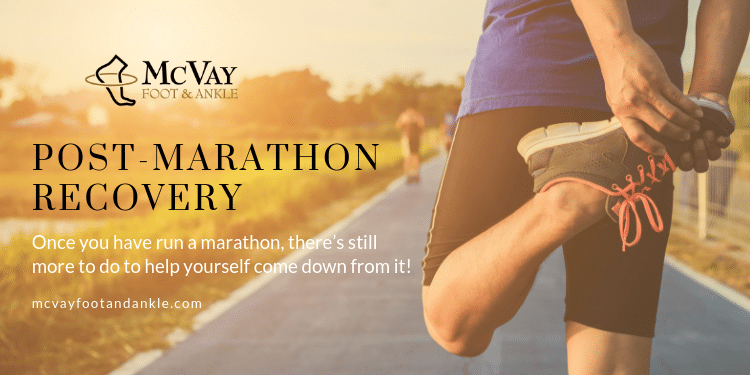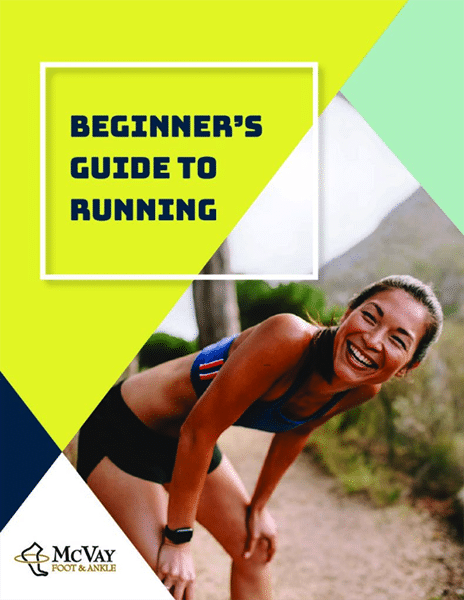How Not to Feel Like You’re Dying After the Colfax Marathon
You have trained. You have made the commitment. And now you’re running down Colfax with an army of other like-minded and dedicated people pounding the pavement beside you. This is awesome!
We guarantee that you will feel an unparalleled sense of satisfaction and accomplishment when you cross the finish line of your first marathon, surrounded by the cheers of a supporting crowd.
You will also likely feel exhausted, wobbly, perhaps a little nauseous…
Proper marathon training does not stop at the finish. You have pushed your body to its limits over the course of 26.2 miles. Good follow-up care is not just something you deserve; it’s something you need to help your body recover!
Following is some advice on what to do immediately after running a marathon as well through the hours and days ahead. The goals here are simple: less aching and more celebrating!
Immediately After Finishing
Take the space blanket. If you’ve ever seen runners wrapped in silvery space blankets after a marathon, you might have thought they were off their rockers. You just ran a marathon! You should be plenty warm!
But the reality is our body temperatures can drop fast once we slow down. Even if you feel like you’re on fire once you cross the finish line, you quickly won’t. Thermal blankets are a way to help keep this temperature shift from happening too quickly, sending an already spent runner into involuntary shivers and potential collapse. Plus, they’re shiny and cool.
Keep moving. We know you’ve already gone 26.2 miles, but stopping immediately after you cross the line is not good for your muscles. Help them cool down and prevent seizing up by walking slowly for at least 15 minutes following the finish. It doesn’t have to be vigorous or determined; just wander around a bit.
Get some food in your system. There’s good reason why there’s food and liquids at the end of a run. Your body needs fluids and restoring energy, pronto! The spread after a marathon usually contains the types of foods that are best—carbs, potassium, some salts, and water or sports drinks. Avoid alcohol and caffeine.
You don’t have to down this stuff quickly, but you should still have something. If you’re feeling a little nauseous, which is normal, then your intake should be slow. Sip liquids and eat small bites.
Avoid the complimentary massage. Some races offer massage tables with the intent of muscle relief and pampering after a run. It might sound like a no-brainer, but your muscles are not in great condition right now for such a treatment.
When we exert ourselves in a marathon, we’re essentially creating a massive amount of tiny tears in our muscles. This is normal, and they come back stronger, but is it really a good idea to have someone’s fingers getting down into deep tissue that is currently so broken up? A little light massage can be fine, but it’s best to do it yourself or in the hands of someone you know.
Bring a dry pair of clothes. Getting out of sweaty clothes and into a dry pair will not only feel more comfortable, but help keep your body heat from fluctuating so severely. The Colfax Marathon has a bag check you can use to store the extra set of clothes you need.
In the Hours Following the Race
Try not to sit too long. It will likely feel good at first to sit for the ride back home. If it’s going to take a while, though, consider making a pit stop along the way to walk around a bit more. Leave your muscles still for too long and you might have trouble getting out of the car! And once you do get home, engage in another 15 or so minutes of slow walking to stay loose.
Also, you should not be the one driving. Although the risks are low, you might experience dizzy spells or fainting in the hours following the marathon. Leave the driving to someone who can keep an eye on you.
Take a shower. There are a couple ways you can go about this.
Some swear by a lukewarm shower or bath, while others opt for alternating between hot and cold water on your legs (one minute of each). It is believed that the changes in heat will open and close your blood vessels, increasing blood flow to your legs.
Whatever you do, don’t take an actual hot shower. Consistent heat may cause further damage to your muscles.
Have a nice dinner (but not too big). Evening is a good time for a celebratory pasta meal! High carbs and some protein are a great help for your recovery.
However, make sure not to go overboard. You might feel like eating a ton in celebration, but your body still might not be fully prepared to digest it all yet. And what it doesn’t digest is going to come out—one way or another.
In the Days Beyond
When should you start running again? You should absolutely give your body some time to recover after a marathon. Starting right back into things may put too much strain on your body—especially when your feet and Achilles tendons are concerned.
It is important to move in the days following the marathon, but keep it to a brisk walking pace at most. After a couple weeks of recovery, start light jogging again and working your way up.
Stick to a balanced diet. Do not worry about some weight gain after the marathon. This tends to come from your body retaining water as part of recovery. Don’t diet. Instead, maintain a balanced, reasonable diet that includes the nutrients your body needs for recovery.
Get consistent sleep. Sleep is our body’s repair mode. The more you stay on schedule with sleep, the easier your body will be able to take advantage of these times.
You should be proud of your accomplishment, and perhaps—once you’ve recovered—you’ll want to take on another marathon in the future!
McVay Foot & Ankle is here to help you throughout your running journey, from planning to keep your feet and ankles at their peak to providing treatment if problems develop. We’d love to be in your cheering corner!
Call our Colorado Springs office at (719) 266-5000 anytime you have questions or need foot and ankle help. You can also fill out our online contact form if you prefer to reach us electronically.
Get Our Running Guide Today!
In our guide, you’ll learn more about:
- The benefits of a well-planned running routine
- When you should see a doctor if you have concerns or an injury
- How fast you should progress
- The best shoes to get for your feet
- The best food for recovery
Inside, you’ll also receive a running calendar that can help you get started for a 5K run!
© McVay Foot & Ankle. All Rights Reserved
Web Design by CP Solutions
Marketed by VMD Services
Privacy Policy | Terms & Conditions


